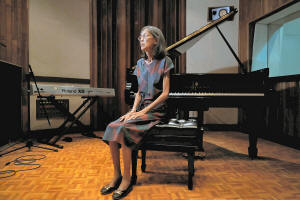Surviving the pandemic: blind Cuban piano tuner struggles to make ends
meet
 Send a link to a friend
Send a link to a friend
 [October 21, 2020]
HAVANA (Reuters) - Flora Villareal,
67, part of a cohort of Cubans who graduated from an experimental piano
tuning program for the blind and visually impaired in 1970, is still
plying her trade half a century later. [October 21, 2020]
HAVANA (Reuters) - Flora Villareal,
67, part of a cohort of Cubans who graduated from an experimental piano
tuning program for the blind and visually impaired in 1970, is still
plying her trade half a century later.
But this year has been hard because of the pandemic. She usually works
for Havana's recording studios and performance venues, which had to
close down for many months during Cuba's coronavirus lockdown.
"It's been very difficult because there's virtually been no work," said
Villareal, a wiry woman with silver shoulder-length hair who uses a
white walking stick. "And I've also had to look after myself because you
never know where there's coronavirus."
Born into a family with a genetic predisposition toward visual
impairment, only one of her three siblings still lives. She has a son
and granddaughter in the city of Matanzas, about 62 miles (100 km) east
of Havana, and visits there once a year.

"I live on my own so it's been a bit difficult to be looking after the
house while also going out working and looking for stuff," said
Villareal, who retired from working for state cultural institutions in
2012 but still works privately to supplement her monthly pension
equivalent to just $13.
Shortages of goods in Communist-run Cuba have worsened as the pandemic,
which demolished tourism and hardened U.S. sanctions, further squeezed
the struggling centrally planned economy.
Cuba's tough lockdown, including the suspension of public
transportation, has enabled it to contain its coronavirus outbreak but
made it even harder for Cubans like Villareal to make ends meet and hunt
for scarce goods.
Her disability and highly specialized profession – on the sidelines of a
music world hard hit by the ban on public gatherings – have made it
particularly tough for her to get by.
"But you get on with it because you always end up overcoming
difficulties," she said.
Now at least, work is picking up again slightly for Villareal, after the
government announced this month Cuba needed to adapt to a "new
normality." Public transportation and most activities would resume, it
said, albeit with precautions to prevent the spread of coronavirus, like
reduced capacity in concert halls.
[to top of second column]
|

Piano tuner Flora Villareal talks to a client (not pictured) in a
recording studio amid concerns about the spread of the coronavirus
disease (COVID-19), in Havana, Cuba, October 12, 2020. Picture taken
October 12, 2020. REUTERS/Alexandre Meneghini

"It's a work worthy of a lot of respect," said Cuban singer and
pianist Haydee Milanes, as Villareal tuned the piano in the
recording studio of her father, one of Cuba's best-known singers,
Pablo Milanes where she was rehearsing.
"It is utterly essential for us musicians that the pianos we use be
well tuned so they sound good."
Villareal is grateful she got the opportunity to learn an
interesting trade at a time when there were few opportunities for
people with her disability.
Piano tuning actually first emerged as a skill particularly suited
to the visually impaired or blind in the 1800s in Europe. The
thinking was in part that their lack of sight would make their sense
of hearing particularly acute.
Villareal is one of the most sought-after piano tuners in Cuba,
where a world-renowned music scene draws on a European and African
heritage.
Still, the sextagenarian expects her trade to gradually disappear as
piano playing loses popularity and technology like tuning software
takes over.
At the same time technological advances like screen readers and
speech recognition software are opening new professional doors for
the visually impaired. But Villareal plans to keep on tuning as long
as she is physically able to.

"I think I will die tuning," she said.
(Reporting by Reuters TV; Writing by Sarah Marsh and Tom Brown)
[© 2020 Thomson Reuters. All rights
reserved.] Copyright 2020 Reuters. All rights reserved. This material may not be published,
broadcast, rewritten or redistributed.
Thompson Reuters is solely responsible for this content. |